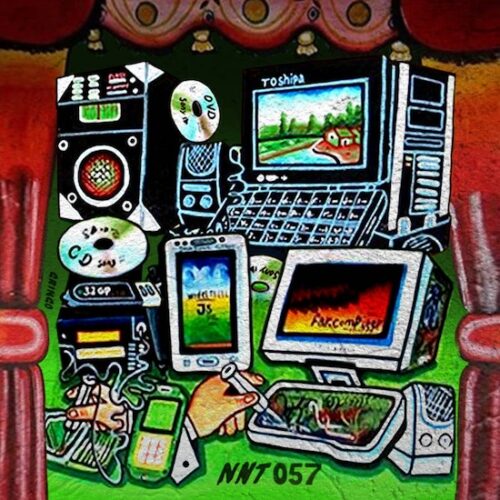In a fragmented global music landscape dominated by micro-scenes and hyper-production, the moments that we can truly celebrate as defining are few and far between. The release of the 2017 compilation Sounds Of Sisso that introduced the world to the blistering 200 BPM, Technicolor sounds of singeli as imagined by artists working at Mohamed Hamza Ally aka Sisso’s studio in Dar Es Salaam was undoubtedly one of them.
Born out of a fusion of Zanzibar’s taarab with countless electronic influences, the tumultuous style would see several other releases by Jay Mitta, Duke, and Sisso himself come out on Nyege Nyege Tapes between 2017 and 2020, before the label went exploring farther and wider into other electronic African folk musics. Now joined by another Tanzanian musician, keyboardist Maiko, Sisso’s return to the Kampala-based imprint is just as triumphant and vital as those early releases.
Singeli Ya Maajabu opens with the absolutely delirious ‘Kivinje’. Here, Sisso strings together a loop of ear-massaging beats as if concocting a score for Maiko to follow with his Yamaha electric piano and FL Studio wired controllers. Maiko’s licks move at the speed of light, frantically jumping between and over the rhythms, sprinkling bleeps and bloops all over the place – think Sonic the Hedgehog losing his rings – and ripping out searing long riffs as if he were playing a rhythm-based video game during a particularly hard boss encounter.
If Nyege Nyege Tapes’ spectrum expanded significantly since their last encounter, the same can be said of Sisso, who now incorporates an even wider array of influences in his music, from techno and footwork to Afrohouse and gqom. Meanwhile, any doubts concerning singeli’s high velocity hindering its evolution are quickly dispelled on Singeli Ya Maajabu. Unlike the aggression inherent to gabber and happy hardcore, the tempos might be unsafe, but they feel breezy.
Similar to how thinly sliced then piled up microsounds lose their individuality and become textures, the sheer speed of singeli’s tight, closely-placed beats melds them into an undulating cord, giving the music an electrifying fluidity and sense of constant motion. ‘Kazi Ipo’ and ‘Kiboko’ make great use of this effect: clinking higher frequencies carry the cadences, while surrounding spaces are filled with stabs of rave psychedelia, neon-drenched synths, squelching pads, and textures that occasionally resemble the hair-rising buzz of a dental drill gone amok.
Singeli Ya Maajabu is also often downright experimental sounding. At times, this idiosyncratic side to what is already wild music appears in gnarly kicks, curious vocal transmutations, synthetic onomatopoeia of motor racing vrooms and zooms, and cartoon effects placed on pieces like ‘Uhondo’, ‘Jimwage’, and ‘Shida’. At others, it manifests in full on cuts like ‘Mangwale’ and ‘Mizuka’ – the first composed of nothing but a mangled Bollywood-esque singsong with no beats in sight, the second a near ambient concrète piece assembled from found sounds and eerie effects. Both strange, both exhilarating.
On the closing cut ‘Ganzi’, a sample taken from Belgian new beat group Confetti’s ‘The Sound Of C’ is overstimulated and sped up for hilarious effect, then interwoven with galloping beats and a frankly glorious synth vamp to end the album in a ferociously joyous spirit of creation. And just like that, another defining moment in club and dance music is born – hyperbole be damned.



